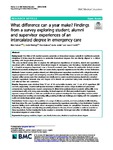What difference can a year make? Findings from a survey exploring student, alumni and supervisor experiences of an intercalated degree in emergency care
| dc.contributor.author | Graham, B | |
| dc.contributor.author | Elbeltagi, H | |
| dc.contributor.author | Nelmes, Pamela | |
| dc.contributor.author | Jenkin, A | |
| dc.contributor.author | Zhu, Chengyong | |
| dc.date.accessioned | 2019-07-08T21:09:45Z | |
| dc.date.issued | 2019-06-06 | |
| dc.identifier.issn | 1472-6920 | |
| dc.identifier.issn | 1472-6920 | |
| dc.identifier.other | 188 | |
| dc.identifier.uri | http://hdl.handle.net/10026.1/14612 | |
| dc.description.abstract |
BACKGROUND: One third of UK medical students undertake an intercalated degree, typically in traditional academic disciplines. It is less usual for students to undertake intercalated degrees that are directly aligned to a clinical speciality with longitudinal placements. This cross sectional survey aims to explore the self-reported experiences of students, alumni and supervisors associated with a clinically oriented intercalated degree in emergency care featuring a longitudinal placement in a hospital emergency department over a 9-month academic year. Themes for exploration include student clinical and academic development, effect on career choice, supervisor experience and the effect on host institutions. METHODS: Current students, previous alumni, and clinical placement supervisors associated with a single intercalated degree programme in urgent and emergency care since 2005 were identified from records and using social media. Separate online surveys were then developed and distributed to current students/ previous alumni and consultant physician supervisors, between May and August 2016. Results are presented using basic descriptive statistics and selected free text comments. RESULTS: Responses were obtained from 37 out of 46 contactable students, and 14 out of 24 supervisors (80 and 63%, respectively). Students self-reported increased confidence in across a range of clinical and procedural competencies. Supervisors rated student competence in clinical, inter-professional and academic writing skills to be commensurate with, or in many cases exceeding, the level expected of a final year medical student. Supervisors reported a range of benefits to their own professional and personal development from supervising students, which included improved teaching and mentoring skills, providing intellectual challenge, and helping with the completion of audits and service improvement projects. CONCLUSIONS: Students report the acquisition of a range of clinical, academic, and inter-professional skills following their intercalated BSc year. A positive experience was reported by supervisors, extending to host institutions. Students reported feeling more enthusiastic about emergency medicine careers on completion. However, as students embarking on this degree naturally bring pre-existing interest in the area, it is not possible to attribute causation to these associations. Further investigation is also required to determine the longer term effect of clinically oriented intercalated degrees on career choice. | |
| dc.format.extent | 188- | |
| dc.format.medium | Electronic | |
| dc.language | en | |
| dc.language.iso | en | |
| dc.publisher | BMC | |
| dc.subject | Emergency medicine | |
| dc.subject | Urgent care | |
| dc.subject | Medical education | |
| dc.subject | Medical school | |
| dc.subject | Intercalated degree | |
| dc.title | What difference can a year make? Findings from a survey exploring student, alumni and supervisor experiences of an intercalated degree in emergency care | |
| dc.type | journal-article | |
| dc.type | Journal Article | |
| plymouth.author-url | https://www.webofscience.com/api/gateway?GWVersion=2&SrcApp=PARTNER_APP&SrcAuth=LinksAMR&KeyUT=WOS:000470993900002&DestLinkType=FullRecord&DestApp=ALL_WOS&UsrCustomerID=11bb513d99f797142bcfeffcc58ea008 | |
| plymouth.issue | 1 | |
| plymouth.volume | 19 | |
| plymouth.publication-status | Published | |
| plymouth.journal | BMC Medical Education | |
| dc.identifier.doi | 10.1186/s12909-019-1579-x | |
| plymouth.organisational-group | /Plymouth | |
| plymouth.organisational-group | /Plymouth/Faculty of Health | |
| plymouth.organisational-group | /Plymouth/Faculty of Health/School of Nursing and Midwifery | |
| plymouth.organisational-group | /Plymouth/Research Groups | |
| plymouth.organisational-group | /Plymouth/Research Groups/Institute of Health and Community | |
| plymouth.organisational-group | /Plymouth/Users by role | |
| plymouth.organisational-group | /Plymouth/Users by role/Academics | |
| dc.publisher.place | England | |
| dcterms.dateAccepted | 2019-04-26 | |
| dc.rights.embargodate | 2019-7-11 | |
| dc.identifier.eissn | 1472-6920 | |
| dc.rights.embargoperiod | Not known | |
| rioxxterms.versionofrecord | 10.1186/s12909-019-1579-x | |
| rioxxterms.licenseref.uri | http://www.rioxx.net/licenses/all-rights-reserved | |
| rioxxterms.licenseref.startdate | 2019-06-06 | |
| rioxxterms.type | Journal Article/Review |


